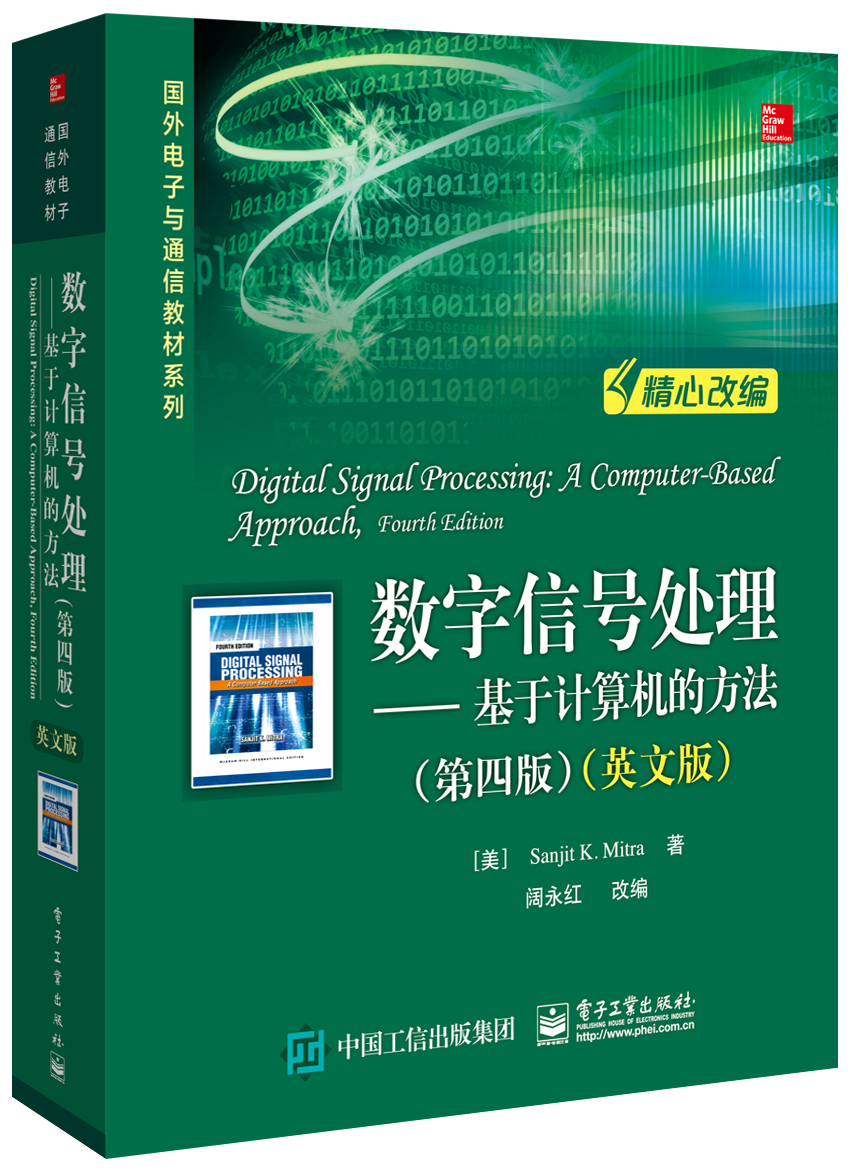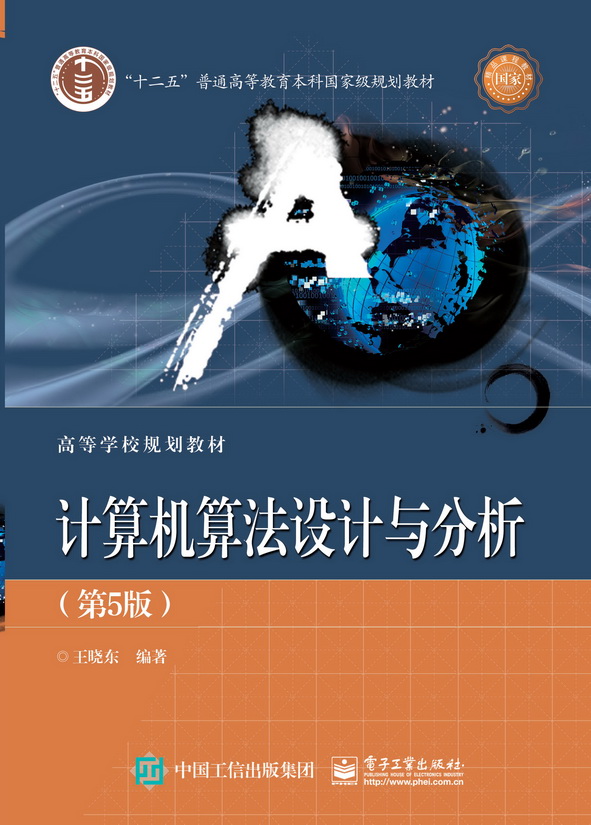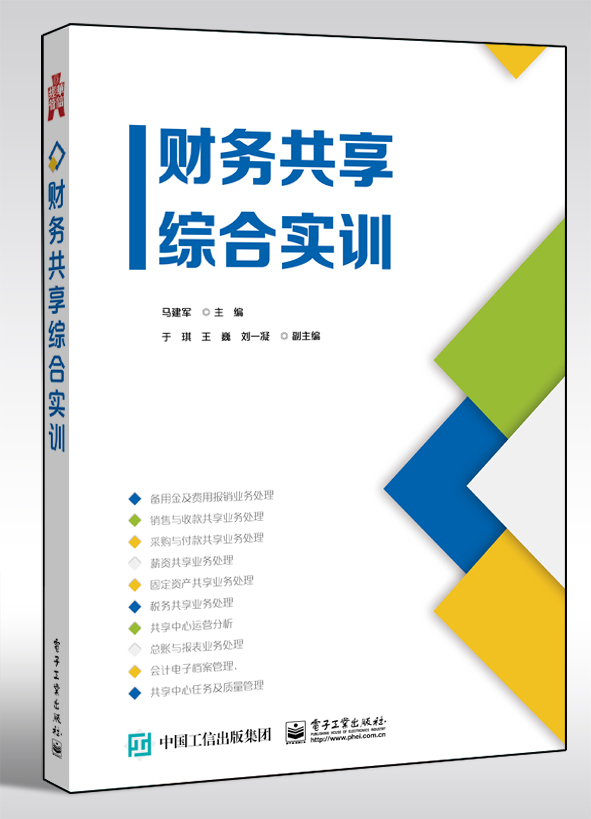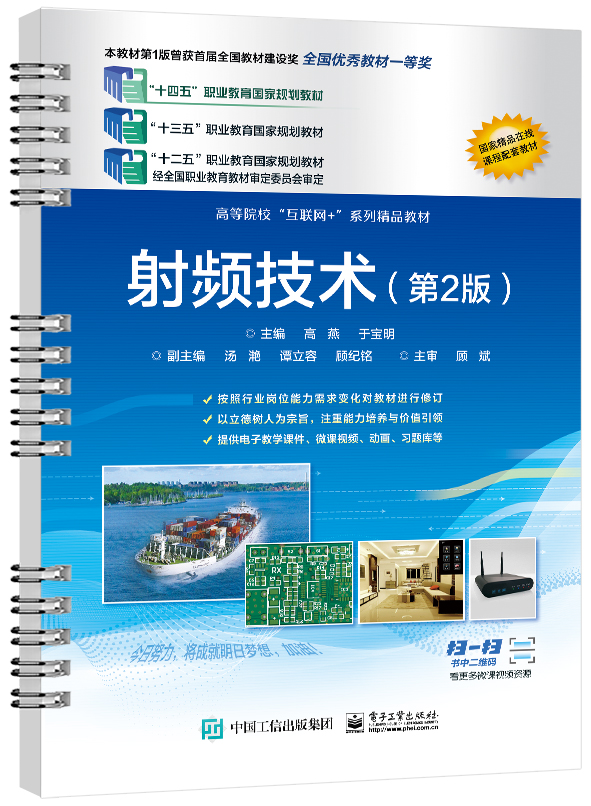数字信号处理——基于计算机的方法(第四版)(英文版)
丛 书 名:
国外电子与通信教材系列
作 译 者:阔永红
出 版 日 期:2018-04-01
书 代 号:G0339090
I S B N:9787121339097
图书简介:
本书是数字信号领域的经典教材Digital Signal Processing:A Computer-Based Approach,Fourth Edition的英文改编版,内容涵盖了信号与信号处理、时域中的离散时间信号、频域中的离散时间信号、离散时间系统、有限长离散变换、z变换、变换域中的LTI离散时间系统、数字滤波器结构、IIR数字滤波器设计、FIR数字滤波器设计、DSP算法实现等方面。本书的特点是,在讲解上述内容的同时,给出了大量简单而实用的例子,并用MATLAB程序进行了验证,同时提供了大量的高质量习题和仿真练习。
-
配 套 资 源
-
图 书 内 容
内容简介
本书是数字信号领域的经典教材Digital Signal Processing:A Computer-Based Approach,Fourth Edition的英文改编版,内容涵盖了信号与信号处理、时域中的离散时间信号、频域中的离散时间信号、离散时间系统、有限长离散变换、z变换、变换域中的LTI离散时间系统、数字滤波器结构、IIR数字滤波器设计、FIR数字滤波器设计、DSP算法实现等方面。本书的特点是,在讲解上述内容的同时,给出了大量简单而实用的例子,并用MATLAB程序进行了验证,同时提供了大量的高质量习题和仿真练习。图书详情
ISBN:9787121339097开 本:16开页 数:636字 数:1165.0本书目录
Table of Contents 1 Signals and Signal Processing 1 1.1 Characterization and Classification of Signals 1 1.2 Typical Signal Processing Operations 4 1.3 Examples of Typical Signals 13 1.4 Typical Signal Processing Applications 21 1.5 Why Digital Signal Processing? 29 2 Discrete-Time Signals in the Time Domain 33 2.1 Time-Domain Representation 34 2.2 Operations on Sequences 38 2.3 Operations on Finite-Length Sequences 47 2.4 Typical Sequences and Sequence Representation 54 2.5 The Sampling Process 64 2.6 Correlation of Signals 66 2.7 Random Signals 72 2.8 Summary 73 2.9 Problems 73 2.10 MATLAB Exercises 79 3 Discrete-Time Signals in the Frequency Domain 81 3.1 The Continuous-Time Fourier Transform 81 3.2 The Discrete-Time Fourier Transform 86 3.3 Discrete-Time Fourier Transform Theorems 97 3.4 Energy Density Spectrum of a Discrete-Time Sequence 103 3.5 Band-Limited Discrete-Time Signals 104 3.6 DTFT Computation Using MATLAB 105 3.7 The Unwrapped Phase Function 105 3.8 Digital Processing of Continuous-Time Signals 107 3.9 Sampling of Bandpass Signals 121 3.10 Effect of Sample-and-Hold Operation 123 3.11 Summary 124 3.12 Problems 125 3.13 MATLAB Exercises 134 4 Discrete-Time Systems 135 4.1 Discrete-Time System Examples 135 4.2 Classification of Discrete-Time Systems 141 4.3 Impulse and Step Responses 145 4.4 Time-Domain Characterization of LTI Discrete-Time Systems 146 4.5 Simple Interconnection Schemes 153 4.6 Finite-Dimensional LTI Discrete-Time Systems 156 4.7 Classification of LTI Discrete-Time Systems 164 4.8 Frequency-Domain Representations of LTI Discrete-Time Systems 167 4.9 Phase and Group Delays 174 4.10 Summary 178 4.11 Problems 179 4.12 MATLAB Exercises 187 5 Finite-Length Discrete Transforms 188 5.1 Orthogonal Transforms 188 5.2 The Discrete Fourier Transform 190 5.3 Relation Between the DTFT and the DFT and Their Inverses 194 5.4 Circular Convolution 200 5.5 Classifications of Finite-Length Sequences 205 5.6 DFT Symmetry Relations 210 5.7 Discrete Fourier Transform Theorems 213 5.8 Fourier-Domain Filtering 219 5.9 Computation of the DFT of Real Sequences 221 5.10 Linear Convolution Using the DFT 223 5.11 Summary 234 5.12 Problems 234 5.13 MATLAB Exercises 247 6 z-Transform 249 6.1 Definition 249 6.2 Rational z-Transforms 253 6.3 Region of Convergence of a Rational z-Transform 255 6.4 The Inverse z-Transform 261 6.5 z-Transform Theorems 269 6.6 Computation of the Convolution Sum of Finite-Length Sequences 277 6.7 The Transfer Function 280 6.8 Summary 292 6.9 Problems 292 6.10 MATLAB Exercises 304 7 LTI Discrete-Time Systems in the Transform Domain 305 7.1 Transfer Function Classification Based on Magnitude Characteristics 305 7.2 Transfer Function Classification Based on Phase Characteristics 314 7.3 Types of Linear-Phase FIR Transfer Functions 321 7.4 Simple Digital Filters 332 7.5 Inverse Systems 349 7.6 Summary 353 7.7 Problems 354 7.8 MATLAB Exercises 368 8 Digital Filter Structures 371 8.1 Block Diagram Representation 372 8.2 Equivalent Structures 375 8.3 Basic FIR Digital Filter Structures 376 8.4 Basic IIR Digital Filter Structures 381 8.5 Realization of Basic Structures Using MATLAB 387 8.6 Allpass Filters 390 8.7 IIR Tapped Cascaded Lattice Structures 399 8.8 FIR Cascaded Lattice Structures 404 8.9 Summary 409 8.10 Problems 410 8.11 MATLAB Exercises 423 9 IIR Digital Filter Design 425 9.1 Preliminary Considerations 425 9.2 Bilinear TransformationMethod of IIR Filter Design 430 9.3 Design of Lowpass IIR Digital Filters 435 9.4 Design of Highpass, Bandpass, and Bandstop IIR Digital Filters 437 9.5 Spectral Transformations of IIR Filters 441 9.6 IIR Digital Filter Design Using MATLAB 448 9.7 Summary 451 9.8 Problems 451 9.9 MATLAB Exercises 457 10 FIR Digital Filter Design 459 10.1 Preliminary Considerations 459 10.2 FIR Filter Design Based on Windowed Fourier Series 463 10.3 Computer-Aided Design of Equiripple Linear-Phase FIR Filters 478 10.4 Design of Minimum-Phase FIR Filters 487 10.5 FIR Digital Filter Design Using MATLAB 488 10.6 Summary 504 10.7 Problems 505 10.8 MATLAB Exercises 512 11 DSP Algorithm Implementation 516 11.1 Basic Issues 516 11.2 Structure Simulation and Verification Using MATLAB 527 11.3 Computation of the Discrete Fourier Transform 534 11.4 Fast DFT Algorithms Based on Index Mapping 549 11.5 DFT and IDFT Computation Using MATLAB 557 11.6 Sliding Discrete Fourier Transform 559 11.7 DFT Computation over a Narrow Frequency Band 559 11.8 Summary 564 11.9 Problems 564 11.10 MATLAB Exercises 572 A Analog Lowpass Filter Design 575 A.1 Analog Filter Specifications 575 A.2 Butterworth Approximation 577 A.3 Chebyshev Approximation 579 A.4 Elliptic Approximation 582 A.5 Linear-Phase Approximation 583 A.6 Analog Filter Design Using MATLAB 584 A.7 Analog Lowpass Filter Design Examples 587 A.8 A Comparison of the Filter Types 589 A.9 Anti-Aliasing Filter Design 592 A.10 Reconstruction Filter Design 594 B Design of Analog Highpass, Bandpass, and Bandstop Filters 599 B.1 Analog Highpass Filter Design 599 B.2 Analog Bandpass Filter Design 601 B.3 Analog Bandstop Filter Design 604 Bibliography 605展开前 言
改编者序 自教育部于2001年出台《关于加强高等学校本科教学工作提高教学质量的若干意见》以来,双语教学工作在许多高校开展起来,尽管对于双语教学的意义、效果的讨论一直没有中断过,但发展现状表明双语教学仍在较为迅速地发展。 不同院校开展双语教学的层次不同,最基本的要求是采用原版教材,主要是学习国外先进的教学思想,科学技术和语言文化;由于文化传统、教学体系的差异,原版教材与我国教学体系和教学习惯的矛盾是存在的。 “数字信号处理”是开展双语教学较早、较为普及的课程,很多学校都选择了Sanjit K. Mitra 编写的本书第二版的影印版作为课本。Mitra 博士是国际著名的信号处理专家、 IEEE 电路与系统学会的主席和多家国际著名学术刊物的编委,他的教材不仅详细介绍了数字信号处理的经典内容,也介绍了许多数字信号处理的最新发展及应用实例,是理论与实践结合的典范。书中有大量的例题、高质量的练习题和上机仿真作业,并用 MATLAB 来演示结果。该教材在美国加州大学、哥伦比亚大学、明尼苏达大学等著名大学使用,销量大。 原版教材的内容叙述非常详尽,实践性强,使得原版书通常很厚,容量是国内自编教材的几倍。国内的高校数字信号处理课程基本是一个学期完成的,因此在实际的教学过程中,教材的1/3内容基本不涉及。由于国内双语教学的开展还没有系统化,学生的英文水平也有较大差异,造成了学生的学习负担加重。因此,对原版教材进行改编,以适应国内课程内容及教学改革的要求,都是一件有意义的工作。 该书第三版出版后,电子工业出版社委托我进行了改编,取得了较好的效果。第四版与第三版相比,作者根据教师与学生的反馈意见,进行了较大的改动与修订;为此,电子工业出版社继续委托我对此书进行了改编。 在改编教材的过程中,主要考虑是在保证教学内容的前提下,压缩教材的篇幅,减轻学生的学习负担;同时兼顾到不同院校的具体教学大纲,尽可能使选择的内容覆盖中文数字信号处理的内容。与原版教材相比,改动如下:删除了1.4.1节、4.8.5节和4.8.6节、5.11节至5.14节、7.4.5节、7.5节、7.7节至7.9节、8.7节、8.9.2节、8.10节至8.12节、9.7节、10.6节、11.8节和11.9节,第12章全部、第13章全部、第14章全部、附录C。教材的编排仍沿用原版教材的体系,仅对删除相关内容后的全书进行了标题序号调整、引用调整等。 原书附带光盘一张,为降低图书成本,改编后的本书,其光盘内容放在华信教育资料网上,请读者自www.hxedu.com.cn下载。 阔永红展开作者简介
本书暂无作者简介 -
样 章 试 读
-
图 书 评 价 我要评论










